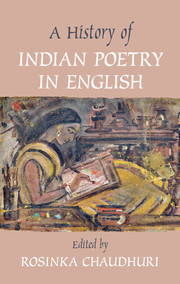Book contents
- Frontmatter
- Contents
- Contributors
- Acknowledgments
- Introduction
- SECTION I THE BROAD NINETEENTH CENTURY: INDIANS IN ENGLISH AND THE ENGLISH IN INDIA
- 1 The First Indian Poet in English: Henry Louis Vivian Derozio
- 2 English Poetry in India: The Early Years
- 3 From Albion's Exile to India's Prodigal Son: The English Poetry of Michael Madhusudan Datta (1824–1873)
- 4 Transforming Late Romanticism, Transforming Home: Women Poets in Colonial India
- 5 The Locations and Dislocations of Toru and Aru Dutt
- 6 Poetry of the Everyday: Comic Verse in the Nineteenth Century
- 7 Toru Dutt and “An Eurasian Poet”
- 8 Rabindranath Translated to Tagore: Gitanjali Song Offerings (1912)
- SECTION II PUBLISHERS, PUBLISHING HOUSES, AND THE PERIODICAL PRESS
- SECTION III POETRY: 1950–2000
- SECTION IV POETS OF THE DIASPORA
- SECTION V THE NEW MILLENNIUM POETS ON THEMSELVES
- Bibliography
- Index
4 - Transforming Late Romanticism, Transforming Home: Women Poets in Colonial India
from SECTION I - THE BROAD NINETEENTH CENTURY: INDIANS IN ENGLISH AND THE ENGLISH IN INDIA
Published online by Cambridge University Press: 05 March 2016
- Frontmatter
- Contents
- Contributors
- Acknowledgments
- Introduction
- SECTION I THE BROAD NINETEENTH CENTURY: INDIANS IN ENGLISH AND THE ENGLISH IN INDIA
- 1 The First Indian Poet in English: Henry Louis Vivian Derozio
- 2 English Poetry in India: The Early Years
- 3 From Albion's Exile to India's Prodigal Son: The English Poetry of Michael Madhusudan Datta (1824–1873)
- 4 Transforming Late Romanticism, Transforming Home: Women Poets in Colonial India
- 5 The Locations and Dislocations of Toru and Aru Dutt
- 6 Poetry of the Everyday: Comic Verse in the Nineteenth Century
- 7 Toru Dutt and “An Eurasian Poet”
- 8 Rabindranath Translated to Tagore: Gitanjali Song Offerings (1912)
- SECTION II PUBLISHERS, PUBLISHING HOUSES, AND THE PERIODICAL PRESS
- SECTION III POETRY: 1950–2000
- SECTION IV POETS OF THE DIASPORA
- SECTION V THE NEW MILLENNIUM POETS ON THEMSELVES
- Bibliography
- Index
Summary
Women's English language poetry in India – from the late eighteenth-century effusions of the pseudonymous Anna Maria to the early twentieth-century aesthetic verse of Adela Cory Nicolson – addressed the personal, the devotional, and the political. Like other colonial poets, women poets in India were, from a metropolitan perspective, both distant from and belated with respect to the metropole. Before the advent of steam and telegraph at mid-century, the lag of many months for round-trip communication between India and Britain made distance in space and time especially acute for poets born in Britain. Yet, even in the last half of the nineteenth century, notions of cultural, physical, and psychological distance and belatedness shaped the life-worlds of poets writing English regardless of their birthplace, ethnicity, or parentage.
Here I take belatedness and distance (1) as tropes for the gendered maintenance of the poetic canon; (2) as marking the place or displacement of the colonial poet; and (3) in the pragmatic sense defined by physical, temporal, and spatial distance from the metropole. To begin with the pragmatic. The pseudonymous poet “Anna Maria” can serve as an extreme, even amusing case of poetry foundering in the distance from the metropole. “Anna Maria” (b. circa 1770) participated in the late eighteenth-century phenomenon of Della Cruscan poetry, in which pseudonymous poets corresponded in verse in middlebrow London newspapers. Anna Maria's only volume of poetry (Calcutta, 1793) included an elegiac “Ode to the Memory of Della Crusca” commemorating the leading Della Cruscan poet Robert Merry; Anna Maria's poem was written upon a false report of Merry's death. A further “Ode, to Della Crusca” in the same volume admitted the author's belated realization that Mr. Merry “still lives.” Della Cruscan poetry depended for its effect on immediacy, but Anna Maria found herself stranded – talking to herself alone, halfway around the world.
Most poets, of course, avoided this sort of gaffe, or at least purged their published volumes of its evidence, but more subtle forms of displacement shaped their work. I articulate distance and belatedness in the contexts of Dipesh Chakrabarty's suggestive discussion of repetition and displacement.
- Type
- Chapter
- Information
- A History of Indian Poetry in English , pp. 64 - 81Publisher: Cambridge University PressPrint publication year: 2016

